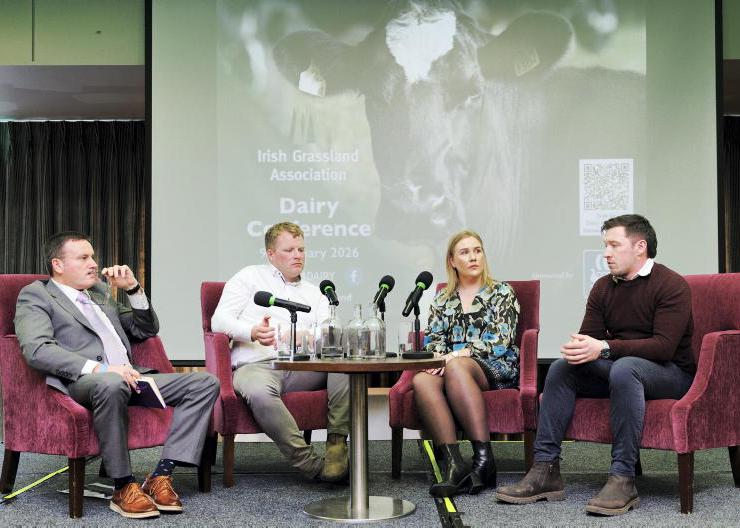As a follow on to last week’s article on restructuring farm debt, personal insolvency may also be an alternative debt solution. If you are in financial difficulty and your loans have been sold to a vulture fund you will need specific professional advice from a personal insolvency practitioner (PIP). A PIP will help you decide on the best debt solution for you and the farm.
In an insolvency situation a meeting should be arranged with your accountant, solicitor and a PIP to discuss the various solutions available to you.
Possible solutions available in an insolvency situation
Immediate Court protection from creditors. Restructure of loans, and/or extension of payment terms.Reduction in interest rates.Potential write down of debt.Retention of your home and farm land. Why do I need a PIP?
A PIP will prepare a full listing of all income, assets and liabilities known as a standard financial statement (SFS). This is the first step in creating a personal insolvency arrangement (PIA), one of three debt solution mechanisms introduced by the Personal Insolvency Act 2012 for people who cannot afford to pay their personal debts. Only a PIP can apply for a PIA which will assist distressed debtors/farmers in reaching a long-term financial solution.
What is a personal insolvency
arrangement (PIA)
The PIA is a solution for people with secured debt (such as, if the title deeds of the farm are held against the farm loan, or a home loan is secured by the mortgage), up to a limit of €3m and unsecured debt (such as credit cards), up to an unlimited amount. It is a formal agreement with creditors that will enable the write-off of some of the unsecured debt and the restructure of any remaining secured debt. There are rules on the various creditors that can be included and ones that must be excluded. A key feature of a PIA is, in a majority of cases, a borrower will be able to remain in their home. A PIA has been effective in some cases of stopping forced sale of lands for farmers.
A protective certificate
The PIP will send the SFS to be reviewed by the Insolvency Service and forwarded to the courts. The court, if satisfied, will grant a protective certificate giving protection from creditors up to 70 days, with an option of a further 40 days. A protective certificate means your creditors cannot contact you during this time. This allows time to put your PIA in place.
Your PIP will put forward the proposed PIA to your creditors. If they agree to it, and the court is happy with your application, your PIA is formally agreed. If a creditor rejects a PIA, the decision can be reviewed and reversed by the court. It is reported that the majority of creditors are agreeing to proposals.
What happens if my circumstances change during the arrangement?
The PIA can be amended by your PIP if your circumstances change during the term of your arrangement. For example if you can no longer afford the agreed repayments your PIP can apply for a change to the arrangement terms. Your PIA is reviewed at least once a year.
What does a PIP cost and what is the Abhaile Scheme?
A PIP may charge a consultation fee to advise a borrower. Under the Abhaile Scheme mortgage holders can avail of free advice. According to R Hendy & Co, specialising in personal insolvency, based in both Enniscorthy and Arklow “people don’t realise if they are in mortgage arrears they can avail of this scheme and free advice, our PIP, Kerry O’Neill will gladly assist”.
Will I ever be able to get credit again if I avail of a PIA?
If you are currently in arrears on payments this may already be known to the credit rating agencies. Entering into a PIA indicates you are dealing with your financial situation, will eventually be solvent, with your debts having been restructured, written down or written off. As your financial situation will have improved lender will decide whether or not to provide further credit to you, which is always the case.
How long does a PIA last ?
Within a PIA all unsecured/personal debt must be paid within six years. Secured debt can be stretched out for longer such as a mortgage or farm debt. The length of the arrangement has to be agreed by all parties.
In November 2020, five farmers avoided having their farms forcibly sold by vulture funds after having protective certificates approved by the Courts with the help of registered personal insolvency practitioner, and farm debt expert Gary Digney, PKF-FPM Accountants, Balbriggan. Digney said some farmers ignore their debt, try to raise finance elsewhere or try to negotiate with the vulture fund. He said vulture funds will issue bankruptcy proceedings to try recover the debt and will appoint receivers to sell the land. The only way to stop this happening is by obtaining a protective certificate from the Court.
There has also been a very successful landmark High Court case in Wexford. The farmer had total debts of €3.2m. His PIA involved completing and selling some investment properties, and using part of his pension fund to repay his debts. His mortgage debt of €1.5m which was used for off-farm investments, and acquired by a vulture fund was written down by over €700,000. The vulture fund had appointed a receiver and sought to sell 31ac of land. All remaining debt included in the PIA has specific repayments deadlines.
In these situations, it is vitally important to get the correct advice, and act early. The ideal professional to engage with, is an experienced PIP and the earlier advice is sought, the more options will be available to you.
Read more
Making on- and off-farm investments
Assessing risk and farmers’ attitude to risk
As a follow on to last week’s article on restructuring farm debt, personal insolvency may also be an alternative debt solution. If you are in financial difficulty and your loans have been sold to a vulture fund you will need specific professional advice from a personal insolvency practitioner (PIP). A PIP will help you decide on the best debt solution for you and the farm.
In an insolvency situation a meeting should be arranged with your accountant, solicitor and a PIP to discuss the various solutions available to you.
Possible solutions available in an insolvency situation
Immediate Court protection from creditors. Restructure of loans, and/or extension of payment terms.Reduction in interest rates.Potential write down of debt.Retention of your home and farm land. Why do I need a PIP?
A PIP will prepare a full listing of all income, assets and liabilities known as a standard financial statement (SFS). This is the first step in creating a personal insolvency arrangement (PIA), one of three debt solution mechanisms introduced by the Personal Insolvency Act 2012 for people who cannot afford to pay their personal debts. Only a PIP can apply for a PIA which will assist distressed debtors/farmers in reaching a long-term financial solution.
What is a personal insolvency
arrangement (PIA)
The PIA is a solution for people with secured debt (such as, if the title deeds of the farm are held against the farm loan, or a home loan is secured by the mortgage), up to a limit of €3m and unsecured debt (such as credit cards), up to an unlimited amount. It is a formal agreement with creditors that will enable the write-off of some of the unsecured debt and the restructure of any remaining secured debt. There are rules on the various creditors that can be included and ones that must be excluded. A key feature of a PIA is, in a majority of cases, a borrower will be able to remain in their home. A PIA has been effective in some cases of stopping forced sale of lands for farmers.
A protective certificate
The PIP will send the SFS to be reviewed by the Insolvency Service and forwarded to the courts. The court, if satisfied, will grant a protective certificate giving protection from creditors up to 70 days, with an option of a further 40 days. A protective certificate means your creditors cannot contact you during this time. This allows time to put your PIA in place.
Your PIP will put forward the proposed PIA to your creditors. If they agree to it, and the court is happy with your application, your PIA is formally agreed. If a creditor rejects a PIA, the decision can be reviewed and reversed by the court. It is reported that the majority of creditors are agreeing to proposals.
What happens if my circumstances change during the arrangement?
The PIA can be amended by your PIP if your circumstances change during the term of your arrangement. For example if you can no longer afford the agreed repayments your PIP can apply for a change to the arrangement terms. Your PIA is reviewed at least once a year.
What does a PIP cost and what is the Abhaile Scheme?
A PIP may charge a consultation fee to advise a borrower. Under the Abhaile Scheme mortgage holders can avail of free advice. According to R Hendy & Co, specialising in personal insolvency, based in both Enniscorthy and Arklow “people don’t realise if they are in mortgage arrears they can avail of this scheme and free advice, our PIP, Kerry O’Neill will gladly assist”.
Will I ever be able to get credit again if I avail of a PIA?
If you are currently in arrears on payments this may already be known to the credit rating agencies. Entering into a PIA indicates you are dealing with your financial situation, will eventually be solvent, with your debts having been restructured, written down or written off. As your financial situation will have improved lender will decide whether or not to provide further credit to you, which is always the case.
How long does a PIA last ?
Within a PIA all unsecured/personal debt must be paid within six years. Secured debt can be stretched out for longer such as a mortgage or farm debt. The length of the arrangement has to be agreed by all parties.
In November 2020, five farmers avoided having their farms forcibly sold by vulture funds after having protective certificates approved by the Courts with the help of registered personal insolvency practitioner, and farm debt expert Gary Digney, PKF-FPM Accountants, Balbriggan. Digney said some farmers ignore their debt, try to raise finance elsewhere or try to negotiate with the vulture fund. He said vulture funds will issue bankruptcy proceedings to try recover the debt and will appoint receivers to sell the land. The only way to stop this happening is by obtaining a protective certificate from the Court.
There has also been a very successful landmark High Court case in Wexford. The farmer had total debts of €3.2m. His PIA involved completing and selling some investment properties, and using part of his pension fund to repay his debts. His mortgage debt of €1.5m which was used for off-farm investments, and acquired by a vulture fund was written down by over €700,000. The vulture fund had appointed a receiver and sought to sell 31ac of land. All remaining debt included in the PIA has specific repayments deadlines.
In these situations, it is vitally important to get the correct advice, and act early. The ideal professional to engage with, is an experienced PIP and the earlier advice is sought, the more options will be available to you.
Read more
Making on- and off-farm investments
Assessing risk and farmers’ attitude to risk










SHARING OPTIONS